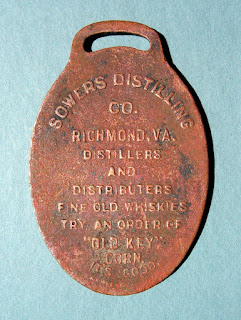

These photographs were shared by a Caswell County collector. The flask may date from 1870 - 1890, but the exact date is unknown.
_______________
Warranted Flask: They were made in great quantity (millions) around the turn of the century. They were generic bottles used by many proprietors to put up there own product. They can be found pretty much all over the country. A large portion of them are not machine made, but have hand tooled lips.
_______________
According to a Sowers descendant, John W. Sowers, who founded the distilling company, wanted to set up his sons to run the distillery, so he paid for them to go to college, each with a different area of focus. He apparently were three sons: James R. Sowers; R. L. Sowers; and R. P. Sowers.
James R. Sowers attended William & Mary pursuing a business degree. He had completed his first year when his father died from gangrene after a car accident. This apparently ended the son's educational pursuits.
Sowers family lore tells about operating the Richmond distillery during the later years of prohibition -- that politicians from DC were their biggest customers. Whiskey, placed in skins and submerged in the bay (for the salt water), then was call "Scotch," claiming it came from Europe.
_______________
SOWERS DISTILLING CO.
1814 Hull
Richmond, VA.
1910
Source: Richmond Business Directory
_______________
Mentions Sowers: Pre-Pro Whiskey Men
_______________
"The John W. Sowers Distillery Company, of Milton, Caswell County, N. C., with a capital stock of $10,000, has just been incorporated. Mr. John W. Sowers is the principal incorporator. Mr. Sowers' capacity for handling this business will, we believe, bring success to the company."
Source: The Wine and Spirit Bulletin, Vol. XX, No. 1. Louisville, KY and Cincinnati, O., January 1, 1907, p.45.
_______________
The following is from When the Past Refused to Die: A History of Caswell County North Carolina 1777-1977, William S. Powell (1977):
Page 155
Bartlett Yancey in 1810, commenting on the great number of distilleries operating in the county which were "nuisances to society," said: "I know of nothing [else] which has so great a tendancy to demoralize Society, except it be the late practice of electioneering by drenching the people with grog, and with falsehoods." [Yancey estimated that more than fifty distilleries were in operation in 1810.]Page 117
The lone distillery in the county in 1850 was owned by William Long who employed two men to operate it. One of them may have been Jesse Zimmerman, native of Davie County, whose occupation that year was a distiller. With a capital investment of $250 it produced 2,000 gallons of whiskey valued at $700.Pages 278-279
Branson's North Carolina Business Directory for 1872 reports that J. W. Lea of Locust Hill and Jon A. Johnston of Pea Ridge were dealers in dry goods and liquor, while one Blackwell at Blackwell's and G. B. Gibson of Milton dealt in groceries and liquor. In 1877 only three sources of liquor were identified in the directory and all were in Yanceyville: M. H. Graves, retail liquor merchant; Kerr & Corbett, groceries and liquor; and Richmond & Gunn, drugs, liquor, and groceries. The threat of prohibition in 1881 may have been responsible for an increase in such business, for in 1883 there were not only seven general merchants who also offered liquor, but there also was a whiskey distiller identified -- John Love of Hightowers who was also listed in 1884. By 1884 specialization seems to have been the rule, except for one McMeachin in Semora whose general store offered liquor, all the others offered only liquor: G. A. Griffith, J. J. Henderson, and N. P. Oliver in Yanceyville; J. T. Baynes, and T. Y. Baynes in Hightowers/ and W. B. McCain and J. M. White in Milton. White's establishment was very plainly identified as a saloon. That list for 1889 identified Felix R. Gordon's business in Milton as a bar, and in 1890 it was reported that there were two saloons in Yanceyville and a saloon and a bar in Milton in addition to other assorted sources of liquor._______________
Note that the label states that the John W. Sowers Distilling Co. was formerly of Ronda, North Carolina, which is a town in Wilkes County, North Carolina (northwest portion of the state). The population was 560 at the 2000 census. Ronda was named after a nearby estate called "Roundabout", which was the residence of Benjamin Cleveland, a locally prominent planter and a colonel in the North Carolina militia during the Revolutionary War.
_______________
___
 |
| Click to See Larger Image |
 |
| Click to See Larger Image |
Apparently during 1905 John W. Sowers, trading as John W. Sowers Distilling Co., of Milton, N.C., filed for bankruptcy. On December 21, 1905, that petition was granted in the U.S. District for the Western District of North Carolina [in Winston-Salem], thereby adjudging the petitioner a bankrupt.
On January 22, 1906, John W. Sowers, trading as John W. Sowers Distilling Co., petitioned the court for a complete discharge in bankruptcy, which would free him from all debts. He represented to the court that he had fully complied with the federal bankruptcy act, including surrendering all his [non-exempt] property.
The court, on February 5, 1906, ordered that a hearing be held on February 19, 1906, to determine whether the Sowers petition should be granted and further ordered that a notice be published in the Union Republican and Caswell County Democrat newspapers notifying creditors and other interested persons so they might appear and show cause why the prayer of Sowers should not be granted.
The referee in bankruptcy also was ordered to mail to all known creditors a copy of the Sowers petition.
The February 19, 1906, hearing was to be the final meeting of creditors.
The proceedings apparently took place in Winston-Salem, but the final results are unknown.
Source: The Union Republican (Winston-Salem, North Carolina), 8 February 1906.
____________
Permalink






No comments:
Post a Comment